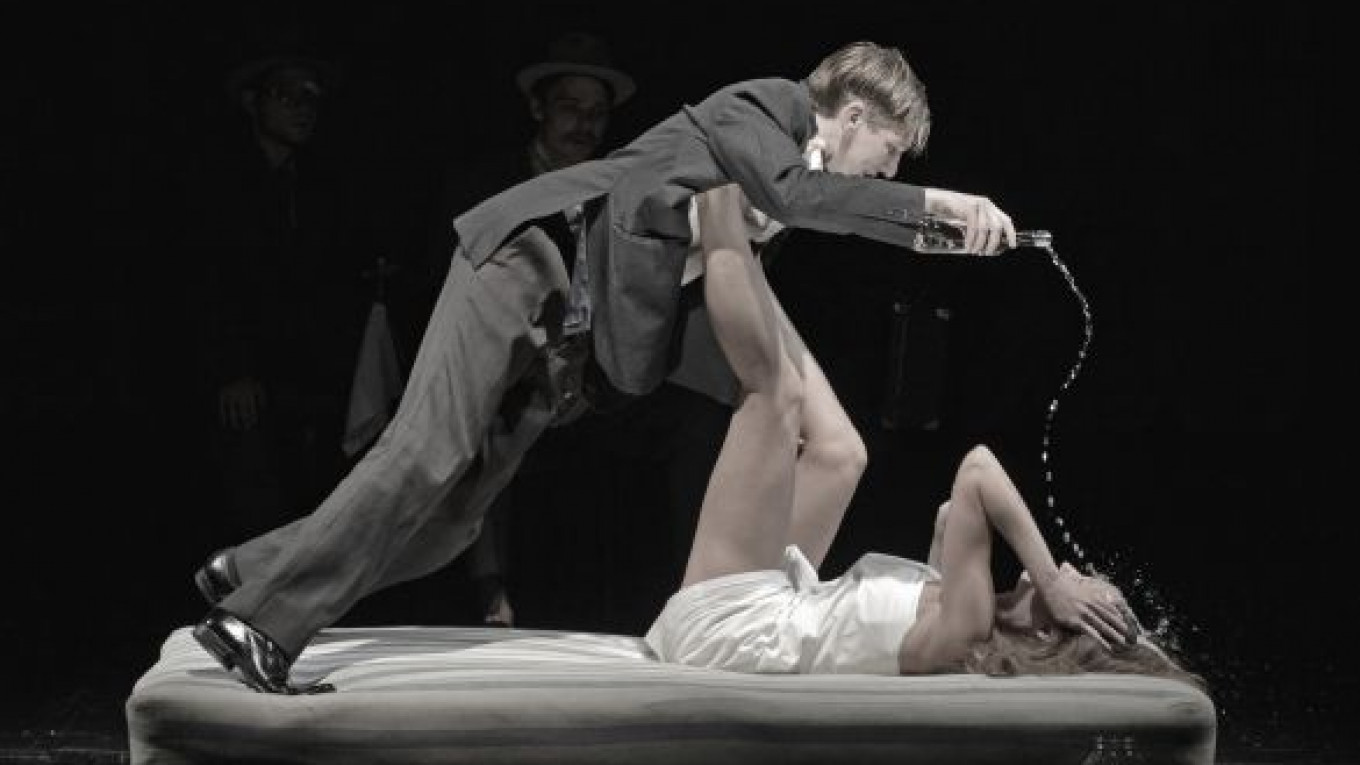“Everything in the world should happen slowly. Slowly and wrong, so that no one gets a big head.”
So says Venichka, the unlikely hero of Venedikt Yerofeyev’s “Moscow-Petushki,” aka “Moscow to the End of the Line,” a novella completed in 1970 that became a classic long before it was finally published in the Soviet Union in 1989.
One could argue that the word “classic” is what matches the work with Sergei Zhenovach and his Studio of Theatrical Art. Authors usually staged here are of the “classic” kind: Dostoevsky, Dickens, Chekhov and Gogol. A beautiful production of Andrei Platonov’s “Potudan River” a few years ago was a rare foray into the 20th century.
But Yerofeyev was a phenomenon of the late Soviet era, the so-called period of stagnation. His novella, which he called a poem, engaging in that lovely Russian tradition of making mincemeat of genres and labels, became a runaway “best-seller” in the 1970s, although I doubt a single copy was sold in the Soviet Union.
Published properly abroad, in its homeland it was exclusively distributed hand to hand in that ingenious Soviet system known as samizdat. People would type it up, making numerous carbon copies, and they would pass those on to friends who repeated the process.
Yerofeyev was a true underground hero of late Soviet literature. His most important work virtually did not exist in official realms, while there were few literate adults of the time who did not know, love and deeply understand the significance of “Moscow-Petushki.”
It is a tale in which total futility is blessed with profound significance. A summary of its action is pretty bare: A man who appreciates his vodka wants to reach the end of the line on the Moscow-Petushki commuter train but can’t do it. Ultimately, he finds himself back in Moscow where he began.
Zhenovach presents the tale as a series of tableaus. Thus, we encounter a couple of guardian angels (Katerina Vasilyeva, Miriam Sekhon) following Venichka around. There is a comically crass waitress (Tatyana Volkova) who often turns up when new bottles of vodka are required. There are a host of friends, idiot-savants, just plain idiots, and co-drinkers who are always willing to discuss the nature of the universe, the secrets of life and the power of love — as long as vodka is part of the conversation.
How much of the story actually happens and how much is imagined by Venichka is beside the point. In a world where one’s public life is hopelessly drab and severely regimented, it is the inner life, the life of the imagination and the spirit, that becomes the place of real experience and meaning.
It doesn’t, in other words, matter so much what you are striving for, as long as you strive for something. In Venichka’s case, it may be the next bottle of vodka, or it may be his lovely wife and child, who live at the end of the line in the idyllic town of Petushki.
Venichka’s tales of his wife (Maria Kurdenevich), designated lovingly as a Ballad of a Woman, reach the height of romantic and erotic description. Could it be because he never actually makes it into her arms? Or could it be that reality can’t possibly match what the mind imagines? Or does that just make me a cynic? In any case, Yerofeyev and Zhenovach play a game with us, as if saying, “You don’t believe us? That’s your problem! In our minds, the world is a place of wonder and beauty!”
As Venichka, Alexei Vertkov is a scholar and a gentleman. Sporting a tuxedo jacket and bow tie, he has quite the look of a man heading out to a social rout, an elite, invitation-only reception. Only his slightly unkempt hair, his furtive body movements and that vague look of confusion that occasionally runs across his usually certain face suggest that something is out of place.
Bottles are everywhere in Alexander Borovsky’s set. A huge, rattling chandelier hanging above the audience is made of empty bottles, as is another that hangs on stage over a table or a conjugal bed.
Since the production runs more than three hours, I would hazard to say that in performance we get more of this tale than we need. The pleasure, humor and revelations that come with reading each of Yerofeyev’s finely chiseled words does not translate to seeing most of them performed. Still, long as it is, this is a sensitive, funny and sometimes beautiful take on a true Soviet classic.
“Moscow-Petushki” (Moskva-Petushki) plays Fri., Nov. 23, 30, Dec. 1 and Dec. 19 at 7 p.m. at the Studio of Theater Art, 21 Ulitsa Stanislavskogo, Bldg. 7. Metro Taganskaya. Tel. 495-646-7459. . Running time: 3 hours, 15 minutes.
Related articles:
A Message from The Moscow Times:
Dear readers,
We are facing unprecedented challenges. Russia's Prosecutor General's Office has designated The Moscow Times as an "undesirable" organization, criminalizing our work and putting our staff at risk of prosecution. This follows our earlier unjust labeling as a "foreign agent."
These actions are direct attempts to silence independent journalism in Russia. The authorities claim our work "discredits the decisions of the Russian leadership." We see things differently: we strive to provide accurate, unbiased reporting on Russia.
We, the journalists of The Moscow Times, refuse to be silenced. But to continue our work, we need your help.
Your support, no matter how small, makes a world of difference. If you can, please support us monthly starting from just $2. It's quick to set up, and every contribution makes a significant impact.
By supporting The Moscow Times, you're defending open, independent journalism in the face of repression. Thank you for standing with us.
Remind me later.


